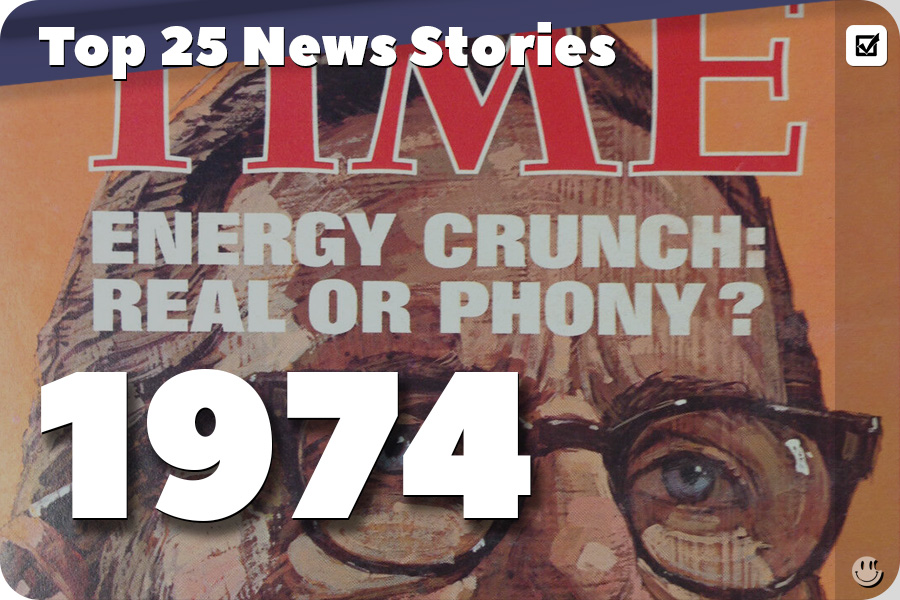 |
Top 25 News Events of 19741. President Richard Nixon Resigns (August 8, 1974): The resignation of President Richard Nixon was a landmark moment in American history. Facing almost certain impeachment due to the Watergate scandal, Nixon’s departure underscored the constitutional checks and balances and profoundly influenced the nation’s political climate. 2. Patricia Hearst Kidnapped (February 4, 1974): The kidnapping of Patricia Hearst by the Symbionese Liberation Army (SLA) captured national attention. Her subsequent indoctrination and criminal involvement with the group spurred widespread media coverage and public debate on coercion and radical politics. 3. “Rumble in the Jungle” – Ali vs. Foreman (October 30, 1974): The boxing match between Muhammad Ali and George Foreman in Zaire, known as “The Rumble in the Jungle,” became one of the most historic events in sports. Ali’s victory was a significant moment in his career and impacted the sporting world. 4. Turkish Invasion of Cyprus (July 20, 1974): The Turkish invasion of Cyprus following a Greek-supported coup led to a prolonged conflict and division of the island, highlighting the complexities of regional politics and ethnic divisions. 5. Global Energy Crisis Intensifies (1974): The ongoing energy crisis reached new heights as oil prices skyrocketed due to OPEC’s embargo and production cuts. Time Magazine’s crisis coverage emphasized its global impact and the necessity for energy reform and innovation. 6. India’s First Nuclear Test (May 18, 1974): India conducted its first successful nuclear test, codenamed “Smiling Buddha,” joining the exclusive group of nuclear-armed nations and altering the geopolitical landscape of South Asia. 7. Watergate Scandal Trials (1974): The Watergate scandal continued to unravel with the conviction and sentencing of several of President Nixon’s aides. The trials and ongoing investigations exposed the extent of corruption and cover-ups within the administration. 8. Famine in Bangladesh (1974): Bangladesh faced a catastrophic famine, exacerbated by political instability and economic mismanagement. The crisis led to an estimated death toll in the hundreds of thousands and highlighted the urgent need for international humanitarian assistance and sustainable development strategies. 9. Lord Lucan Disappears (November 7, 1974): The disappearance of British peer Lord Lucan following the murder of his family’s nanny became one of the most enduring mysteries in the UK, sparking decades of intrigue and speculation. 10. Hank Aaron Breaks Home Run Record (April 8, 1974): Hank Aaron of the Atlanta Braves broke Babe Ruth’s longstanding MLB home run record, a milestone achievement in sports history that faced significant racial backlash and highlighted the ongoing struggle for equality in America. 11. Carnation Revolution in Portugal (April 25, 1974): The Carnation Revolution led to the overthrow of Portugal’s Estado Novo dictatorship, ending decades of authoritarian rule and initiating significant democratic and social reforms. 12. Discovery of Lucy (November 24, 1974): The discovery of the ancient hominid remains known as Lucy in Ethiopia offered groundbreaking insights into human evolution, capturing the public’s imagination and significantly advancing the field of paleoanthropology. 13. Helmut Schmidt Becomes West German Chancellor (May 16, 1974): Following the resignation of Willy Brandt, Helmut Schmidt took office as Chancellor of West Germany, marking a new era in German politics during a critical period of the Cold War. 14. Impeachment Proceedings Against President Nixon Begin (May 9, 1974): The Judiciary Committee of the House of Representatives initiated formal impeachment proceedings against President Nixon. This process intensified the Watergate scandal’s political fallout. 15. Stephen King Publishes Carrie (April 5, 1974): The publication of Stephen King’s first novel, Carrie, marked the emergence of a new voice in horror literature, setting the stage for King’s prolific and influential career. 16. Mikhail Baryshnikov Defects from the Soviet Union (June 29, 1974): Renowned ballet dancer Mikhail Baryshnikov defected to the West, a high-profile departure that underscored the cultural and ideological rifts of the Cold War. 17. Isabel Perón Becomes President of Argentina (July 1, 1974): Following the death of her husband, Juan Perón, Isabel Perón assumed the presidency, becoming the first female president in the Western Hemisphere amid Argentina’s turbulent political landscape. 18. Expo ’74 World’s Fair in Spokane (May 4, 1974): Expo ’74, the environmentally themed World’s Fair held in Spokane, Washington, reflected growing global concern for environmental issues and promoted the concept of sustainable development. 19. Altair 8800 Ushers in Personal Computing Era (December 1974): The release of the Altair 8800, considered one of the first personal computers, marked the beginning of the personal computing revolution, changing technology and society forever. 20. Symbionese Liberation Army Shootout (May 17, 1974): A violent confrontation between the SLA and Los Angeles Police resulted in the deaths of six SLA members, including leader Donald DeFreeze, ending the notorious group’s criminal spree. 21. “Happy Days” TV Show Debuts (January 15, 1974): The premiere of Happy Days introduced audiences to the Cunningham family and the iconic Arthur “Fonzie” Fonzarelli, offering a nostalgic look at American life in the 1950s and became a staple of American television. 22. Evel Knievel’s Snake River Canyon Jump (September 8, 1974): Evel Knievel’s attempt to jump Idaho’s Snake River Canyon in a rocket-powered cycle was a highly publicized stunt that ended in failure but epitomized the era’s fascination with daredevils and extreme entertainment. 23. Chinatown Released (June 20, 1974): The release of the film Chinatown, directed by Roman Polanski and starring Jack Nicholson, offered a dark, complex narrative that became a classic of American cinema and a critical study of power, corruption, and moral ambiguity. 24. The Godfather Part II Released (December 12, 1974): Francis Ford Coppola’s The Godfather Part II expanded on the epic tale of the Corleone family, exploring themes of power, loyalty, and the immigrant experience in America, further cementing the series’ legacy in film history. 25. Philippe Petit’s High-Wire Walk (August 7, 1974): Philippe Petit’s unauthorized high-wire walk between the Twin Towers of the World Trade Center was a daring artistic feat that captured the world’s attention, symbolizing the triumph of audacity and imagination in the face of physical and legal boundaries. Take our 1974 Quiz! |









